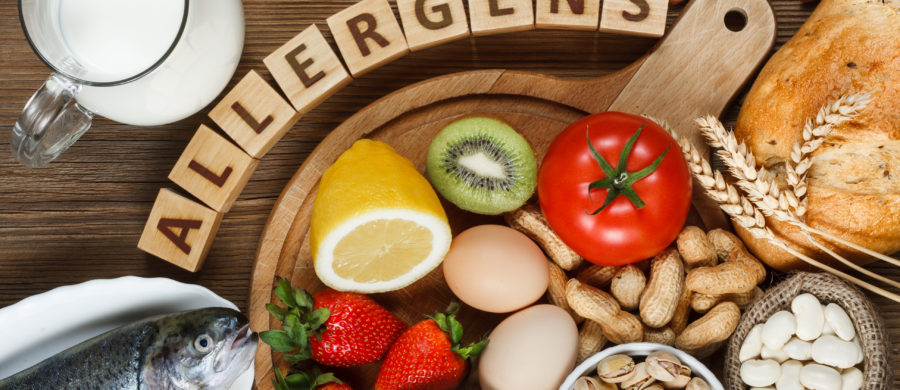This article is the first in a food allergy series by allergist Katherine McCormack, MD.
 Food allergies result from an abnormal immune response to foods that are ingested. When you are allergic to a food, your body has produced antibodies called Immunoglobulin E (IgE) that recognize a specific food or foods as foreign. These antibodies attach to cells throughout your body in the skin, the lungs, and the gastrointestinal (GI) tract. When the food allergen is ingested, these cells release an organic compound called histamine and can cause allergy symptoms, including hives, itchy skin, swelling, nausea, vomiting, diarrhea, coughing wheezing. In some cases, a severe and potentially life-threatening reaction occurs, which is called anaphylaxis.
Food allergies result from an abnormal immune response to foods that are ingested. When you are allergic to a food, your body has produced antibodies called Immunoglobulin E (IgE) that recognize a specific food or foods as foreign. These antibodies attach to cells throughout your body in the skin, the lungs, and the gastrointestinal (GI) tract. When the food allergen is ingested, these cells release an organic compound called histamine and can cause allergy symptoms, including hives, itchy skin, swelling, nausea, vomiting, diarrhea, coughing wheezing. In some cases, a severe and potentially life-threatening reaction occurs, which is called anaphylaxis.
Over 90 percent of food allergies are caused by just nine foods: milk, egg, wheat, soy, peanut, tree nuts, finned fish, shellfish, and sesame. In some individuals, being allergic to one food family (such as tree nuts or seafood) can increase the risk of being allergic to other foods in the same family. Many times, symptoms from a food allergy start within minutes of food ingestion but may occur within two hours at the most. Rarely, a two-phased (biphasic) reaction happens when a second reaction occurs at least one hour after the first.
A unique type of allergy to mammalian meat occurs four or more hours after eating the food, only after becoming allergic following a Lone Star Tick bite (which is not native to Colorado). Two other reactions that may be food-related include food protein-induced enterocolitis syndrome (FPIES) and eosinophilic esophagitis (EoE). FPIES is characterized by delayed onset, profuse vomiting after ingestion of the food trigger(s). This most commonly occurs in infants and is rarer with adults. EoE is an inflammation in the esophagus that specific foods may make worse.
Another type of food reaction occurs due to cross-reactivity with pollens. Some individuals with pollen allergies develop oral symptoms such as itchy mouth, tongue, or throat when eating raw or fresh fruits and vegetables. For example, you may experience a very itchy mouth when eating melons if you are allergic to ragweed pollen. Usually, these fruits and veggies are tolerated when cooked. This type of reaction is called pollen food syndrome or oral allergy syndrome.
About Katherine McCormack, MD
Asthma, Allergy and Immunology Specialist
Dr. Katie McCormack evaluates and treats infants, youth, and adults for the full range of allergy conditions, including seasonal and food allergies. She welcomes new patients to her clinic in Louisville, Colo.
- Dr. McCormack’s Full Profile.
- Call (303) 440-3083 for an appointment


